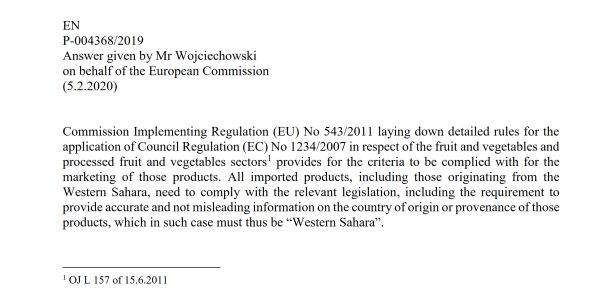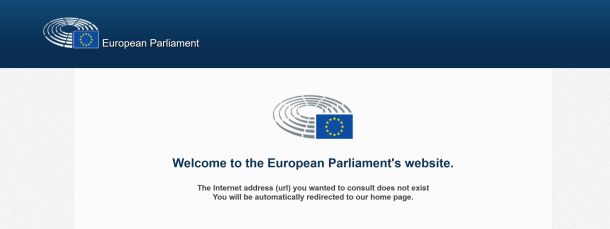The national liberation movement of Western Sahara, Frente Polisario, sent out a press release after the vote in the European Parliament of 16 January 2019 regarding a new trade agreement that covers occupied territory.
The below release was issued by Polisario on the afternoon of 16 January 2019.
FRENTE POLISARIO READY TO CHALLENGE EU-MOROCCO DEAL AT EUROPEAN COURT OF JUSTICE
[BRUSSELS, 16 JANUARY 2019] Today the European Parliament voted to ratify the EU-Morocco agricultural agreement, including the territory of Western Sahara; illegally occupied by Morocco.
We unconditionally reject this agreement as it plainly violates both EU and International law; fails to secure the consent of the Sahrawi people, and threatens to undermine the UN Peace Process. Our legal team are finalising preparations to immediately challenge the agreement at the European Court of Justice.
The ECJ ruling of December 2016 established clearly that Western Sahara is separate and distinct from Morocco, a territory not under the sovereignty of the kingdom. Critically the Court made clear that the EU-Morocco agreements including Western Sahara are not valid unless the Saharawi people, whose only legal representative recognized by the UN is the Frente Polisario, give their consent. The Commission have demonstrably neither genuinely sought nor obtained this consent.
Since December 2016, Morocco’s allies within the EU have sought to force through this illegal agreement; in spite of the overwhelmingly evidence that such an agreement would violate EU law, and prejudge final outcomes of the UN Peace Process. This narrow approach is only possible by the European Commission’s complete disregard for the appalling Human Rights situation under Morocco’s brutal, illegal occupation, and the deliberate disenfranchisement of large parts of the Sahrawi people. We are appalled, and unequivocally condemn this narrow, cynical, and counter-productive approach.
This agreement has been marred by serious questions over its legality, and the deeply questionable conduct of its biggest proponents. The rapporteur for the deal on the Parliament’s International Trade Committee, Patricia Lalonde MEP, resigned following a major conflict of interest with her serving on the board of directors for a notoriously pro-Moroccan organization (EuromedA), she was pushed to resign only a few hours before the vote on her report to the INTA Committee on the 10th December, without any inquiry or change to the substance of her report.
Significant information on the impact of the agreement was presented to the Parliament based on the fact-finding mission conducted by Mrs. Lalonde in September 2018 in two cities in Western Sahara ilegally occupied by Morocco (El Aïoun and Dakhla), along with two other MEPs, Tiziana Beghin and Heidi Hautala. The latter has described the appalling human rights abuses by Morocco she witnessed during the mission, as well as the lack of genuine and free access to assess the situation on the ground. It appears, that the report of Patricia Lalonde, which praises the efforts of Morocco to develop the region, is entirely biased. On this basis, it is unacceptable that this agreement proceeds unchecked and without a full inquiry, in spite of the clear conflict of interest scandal involving its Rapporteur. Concerning Lalonde’s mission;
- 80% of the Mission time was devoted to meetings with Pro-Moroccan interlocutors
- 90% of the mission report is dedicated to Pro-Moroccan voices,
- 1/3 of the territory of Western Sahara and the 175,000 Sahrawi refugees were totally ignored.
Moreover, the claimed "benefits" for the local population of the tariff preferences granted to products from Western Sahara has no relevance to the requirements of the ECJ, for which "a treaty must neither harm nor benefit third parties (such as the Saharawi people) without their consent." Morocco occupies militarily and illegally 2/3 of the territory of Western Sahara; it ilegally exploits the resources to the detriment of the Saharawi people whose right to self-determination - which implies its sovereignty over its natural resources, is quashed by Morocco with the complicity of the European Union.
By encouraging such violations of the rights of our people, with unconditional support from a UN Security Council Member, the European Union sends a deeply concerning message about its commitment to human rights, fundamental freedoms, and its commitment to a UN Peace Process. This agreement undermines the EU principles and values, and further entrenches a status quo the United Nations, United States, and Germany have made clear must change.
The passing of this trade agreement will unquestionably embolden Morocco in its uncompromising attitude towards the UN peace process. The efforts of the Personal Envoy of the UN Secretary-General, Mr. Horst Köhler, to finally reach a solution that allows the self-determination of the Saharawi people are now presented with another major obstacle in the shape of the EU. At a time when prospects opened with the meeting of the parties of the conflict in Geneva on December 5th and 6th, this agreement cleary signals that the EU is not seriously committed to the UN Peace Process.
The Saharawi people, represented by the Polisario Front, will not hesitate to resort to justice at the right time in order to successfully annul this illegal and dangerous agreement. In the meantime, the Polisario Front wishes to express its gratitude to all those in the European Parliament who stood up for human rights and international law today by opposing the agreement.
------------------------------------------------------------------------------
Mohamed Sidati,
EU Representative -
Frente Polisario
EU Commission backtracks on labelling Western Sahara goods
What is EU's position on labelling of products from occupied Western Sahara? The EU Commission has now for the third time published a response to a parliamentary question on the matter, but the latest version fails to address the question.
Why does this EU statement keep disappearing?
A clarification by the EU Commission on labelling of products from Western Sahara was published, then removed, then published again and has now been removed again from EU websites.
EU reaffirms: Western Sahara products to be labelled as such
Two weeks ago, the EU Commission announced that products from Western Sahara should be labelled accordingly, only to withdraw that statement the very next day. Today, the Commission reaffirms its original position.
Spectacular backtracking by EU Commission on Western Sahara labelling
On 5 February 2020, the EU Commission announced that products from Western Sahara should be labelled accordingly. But about 24 hours later, all traces to that statement had been removed from EU websites.



